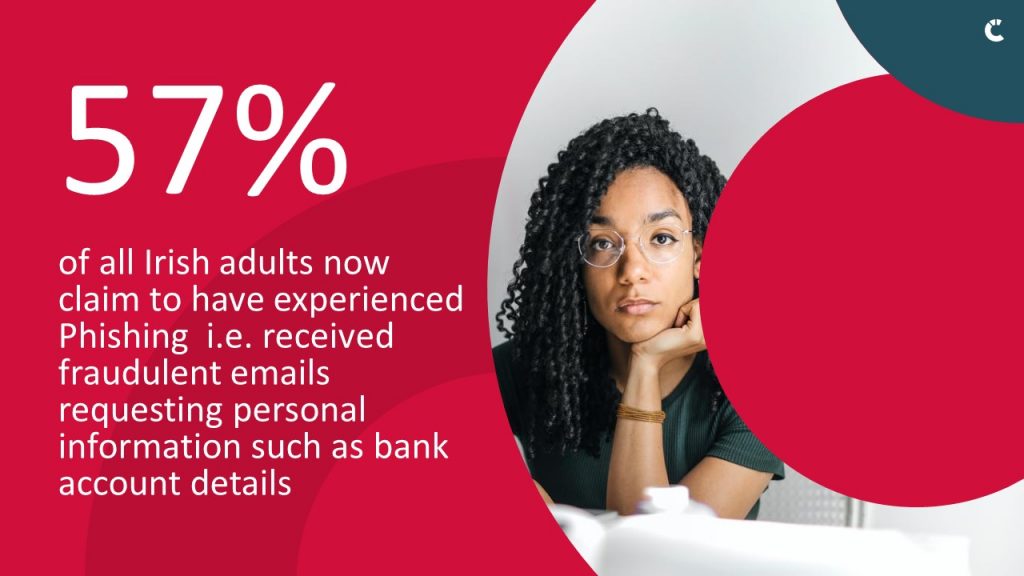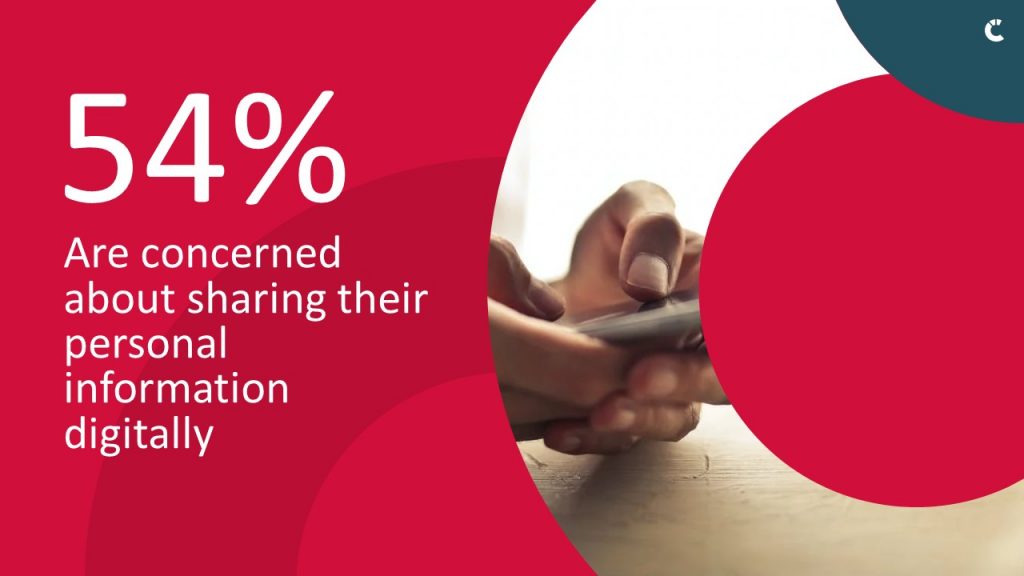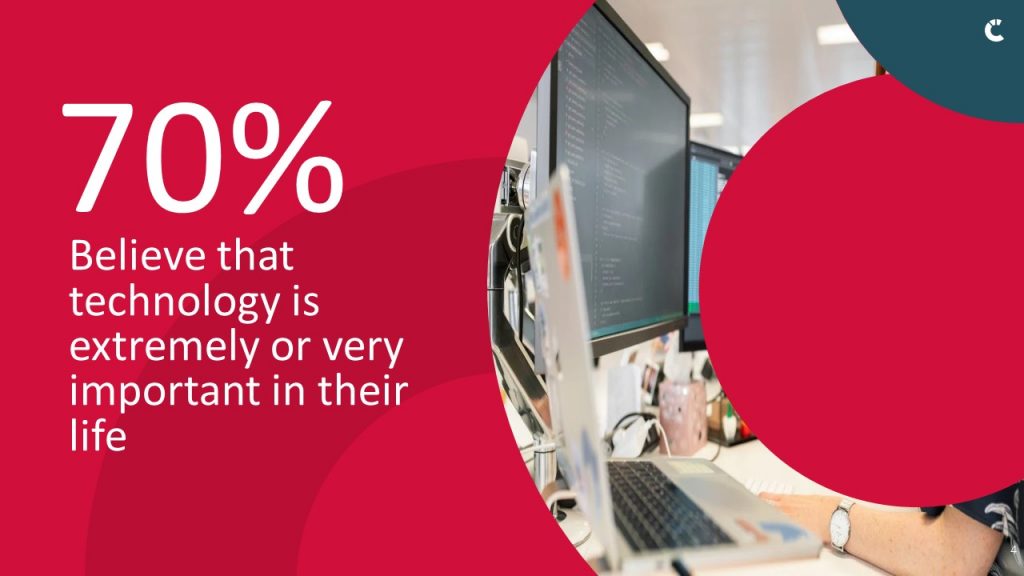Phishing and data fraud have surged in Ireland since 2019
2022.05.17- A significant increase is seen in the number of people that have experienced phishing in Ireland today vs. 2019
- Nearly 3 in 5 (57%) claim having experienced phishing in Ireland, up 14% since 2019, and leaving Ireland as one of the highest populations that has been targeted globally.
- We also see significant rise in those whose personal information has been leaked, with 15% claiming to have experienced this up 9% since 2019.
- 1 in 5 also claim to have had their bank account or credit card hacked, a slight increase compared to 2019, and again ahead of the global average.
- Despite this there is a low level of awareness (26%) among the population, about what happens with the personal information that is shared with data collector.
- Over half (54%) do however show some concern about sharing personal information digitally, with this now back to pre-pandemic levels.
- The majority (70%) do agree that technology is important in their life.
WIN International, the world’s leading association in market research and polling, has published the Annual WIN World Survey (WWS – 2020) exploring the views and beliefs of 33,236 individuals among citizens from 39 countries across the globe about climate change. The survey analyzes views and opinions related to climate change and sustainability.
HEADLINES – IRELAND
Data misuse
- Incidences of phishing (57%) & spamming by companies (46%) is high in 2021, with phishing increasing noticeably across all demographics.
- Phishing is much higher than global average (+14%) in Ireland. Even spamming is slightly higher (+5%) that global levels.
- There is also an increase in serious misuse of personal data; bank account/credit card being used fraudulently (+3%) & email hacked (+1%) with significant rise in personal information being leaked (+9%) compared to 2019.
- On a global level, the Irish report higher than average levels of phishing, spamming, and bank account hacking.
Sharing personal information digitally
- More than half (54%) state concern about sharing personal information digitally.
- This has increased significantly since 2020 (+8%), with this growth highest among those aged 55+ and those from Munster. Compared to the global average, the Irish report higher level of concerns about personal information sharing.
- Only 1 in 4 claim to be aware of what happens with their personal information shared with the data collector, suggesting the need for more transparency. The knowledge level remains relatively low despite this improving since last year, particularly amongst women and lower social grades.
- This understanding of personal information sharing is weaker in Ireland when compared to the global average (-7%).
Technology in your life
- 70% say that technology is an important element in their life, with this being stronger among younger adults & those from ABC1.
- Compared to the global numbers, Ireland is behind the average of 76%.
Richard Colwell, CEO of RED C Research and Vice-President of WIN International Association, said:
“There must be a significant concern about the rising threat of phishing and data fraud in Ireland, as claimed experience of both rise strongly and are well above the global average. Despite this many are unsure of how data they give is handled, and though many are concerned is it important that Irish consumers better understand the risks.”
HEADLINES WORLD
Sharing personal information digitally
- Almost half of the global population (48%) is concerned about sharing personal information digitally, a percentage that increased by three points compared to last year (45%). The level of concern increases among men and women as well: women, from 47% to 50% and men, from 43% to 47%. The increased frequency of online purchases and bank transactions in times of pandemic may have played a role in this scenario: providing private data, without a good virtual security system, can lead to theft or manipulation of personal data for illicit acts.
- More than half of the American continent (54%) feels concerned about sharing their information digitally, a stable result compared to last year. Africa and MENA are regions that experienced the bigger increase compared to last year’s results, raising the level of concern of 22 and 15 percentage points respectively.
- On a country-by-country level, Brazil (72%), China (71%) and Turkey (61%) are the countries that are most concerned about sharing their information digitally. While Lebanon (31%), the Palestinian Territories (30%) and Germany (29%) seem to worry less. Results by country should also be interpreted together with the national context: for example, the local discussions in China regarding the Personal Information Protection Law have played an important role in shaping people’s opinion on the topic.
- Awareness on what will happen with personal information after it is shared with a data collector
- The rising level of concern about sharing personal information online goes hand in hand with an increased awareness about what happens to our data once is shared.
- One third of the global population (33%) say they know what happens with their data, +6% compared to 2020. Although the share increased, there is still a significant majority that ignores the future usage of their personal data.
- China (71%), India (51%) and Brazil (49%) have the highest percentages of awareness of the usage of shared personal data, while Japan (16%), Finland and South Korea (each with 9%) show the lowest results.
Technology in our life
- More than three quarters of the global population (76%) consider that technology is very important in our lives, especially younger generations (82% among 18-24 and 25-34), students (87%) and those with a higher educational level (masters and PhDs). The pandemic might have influenced these results too: in the toughest months, technology was our way to look at the external world, and for students and young people probably even more.
- Technology for people in Africa seems to be fundamental, with 90% of the population considering it extremely or very important. Many countries follow the same trend: Indonesia (98%), Serbia (95%) and India (94%) perceive technology as an essential element in their daily lives, while Ecuador (61%), Poland (60%) and France (50%) consider it important, but not vital.
Data misuse
- According to the results, 7 out of 10 respondents were victims of data misuse (Spamming or/and phishing). Aggressive misuses like personal data leak, email hacked and financial hack were luckily experienced by fewer people (12%, 11% and 11%, respectively); still 34% experimented at least one of the above (compared to 29% in 2019). People from United States (71%), Hong Kong (64%) and Mexico (63%) seem to have had privacy issues more than people in other countries.
Vilma Scarpino, President of WIN International Association, said:
“The impact of the technology in our life has been growing since many years now, but it’s also changing our habits and our perception of the consequences of its misuse. Despite more people are aware of the destination of the personal information they share online, the level of concern does not decrease accordingly: knowing what happens with our data, doesn’t mean we’re not sceptical or worried about it. On top of that, there are still many people ignoring the consequences of online behaviour: knowledge still needs to increase in order to have fully aware customers and consumers, and it really needs to increase, considering more than three out of four people consider technology an important part of their life “
Media enquiries:
IRELAND DATA
Richard Colwell, C.E.O., RED C Research
Derek Bell, Project Manager, RED C Research
+35318186316
WORLDWIDE DATA
Elena Crosilla, WIN Coordinator
+39 335.62.07.347
E-mail: [email protected]
NOTES FOR EDITORS
Methodology:
The survey was conducted in 39 countries using CAWI / online survey methods.
Sample Size and Mode of Field Work:
A total of 33,236 people were interviewed. See below for sample details. The fieldwork was conducted during 15th October 2021 and 18th December 2021. The margin of error for the survey is between 4.4 and 2.5 at 95% confidence level.
The global average has been computed according to the covered adult population of the surveyed countries.
In Ireland, a representative sample of over 1020 adults were conducted online. Fieldwork was conducted in November 2021.
Download the reports below:
WIN World Survey – Technology – Irish Summary Results
WIN World Survey – Technology – Press Release – May 2022







